Vol 2 No. 46 TROPIC LIGHTNING NEWS November 20, 1967
Index
Chopper Finds, Rescues Wounded GI
By SP4 George Hairston
Circling 300 feet above the HoBo Woods, 54 kms northwest of Saigon, the crew
of a 25th Div gunship spotted a wounded man in the dense jungle below.
Rolling in for a closer look, the aircraft commander WO Bruce Wood of Fresno,
Calif., from Delta Trp (Air), 3rd Sqdn, 4th Cav, scanned the terrain. SP5
Sidwayne D. Collins, the crew chief from Pennington, Va., spotted the
infantryman waving his arms. Collins threw a smoke grenade signaling that he
had spotted the wounded man.
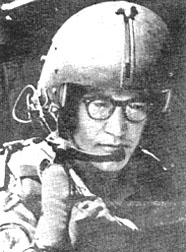 “He looked seriously wounded, but he managed to drag himself into a small
clearing,” Collins said. “Then he threw a smoke grenade to mark his position for
us,” he continued.
“He looked seriously wounded, but he managed to drag himself into a small
clearing,” Collins said. “Then he threw a smoke grenade to mark his position for
us,” he continued.
Circling the area five minutes before the sighting, the gunship had received
several rounds of automatic weapons fire. The wounded man, PFC Arthur B. Lyon
of the 2nd Bn, 14th Inf, was also under fire.
The gunship fired rockets and miniguns into a trench where several VC had
been spotted. Lyon killed one VC himself.
This is remarkable as Lyon had crawled and pulled himself through thick
underbrush all night after his ambush patrol had suffered heavy casualties. He
had been wounded in the leg, lost a great deal of blood, and was unable to walk.
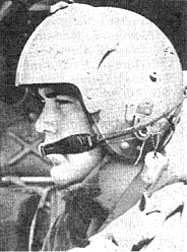 In the face of imminent danger from point blank enemy automatic weapons fire,
Wood took control and eased the helicopter into a clearing 100 meters from the
wounded man. Before he had a chance to ask his crew, they all volunteered to go
in after Lyon.
In the face of imminent danger from point blank enemy automatic weapons fire,
Wood took control and eased the helicopter into a clearing 100 meters from the
wounded man. Before he had a chance to ask his crew, they all volunteered to go
in after Lyon.
“I was proud of my crew and especially Collins who said over the radio that
he insisted on going to get Lyon,” Wood said.
The next three minutes were critical. Wood maneuvered his ship among the
trees at a three-foot hover. WO Howard Anderson, the pilot from Marathon, Fla.,
said, “The landing zone was small and full of stumps and small trees. We could
not land the craft.”
The door machine gunner, SGT Kenneth Wilson of Rosamond, Calif., gave his
M-16 to Collins who had volunteered to get the wounded man. Wilson said,
“Collins was gone a minute or so into the thick brush, then he came back
carrying Lyon. He could have beaten the 4-minute mile easily.”
Covering Collins, Wilson scanned the brush looking for signs of the enemy.
After Collins carefully placed Lyon in the ship, Wood and Anderson coaxed the
helicopter up over the tree tops, the skids dragging branches. The ship was
carrying more than its normal load.
The Delta Trp gunship carried Lyon to the “Tropic Lightning” Div’s 12th Evac
Hosp in Cu Chi. The trip took five minutes.
Wood said, “Lyon thanked us for rescuing him. He didn’t really have to. I
got all the thanks I needed when I saw the expression on his face after we
picked him up.”
12TH INF KILLS 94
DAU TIENG - Five miles northeast of Loc Ninh, 3rd Bde, 25th Inf Div, soldiers
killed 94 Viet Cong in a pitched battle that lasted over six hours. Seven of
the enemy were detained. There were three Americans killed and 30 wounded.
The heated battle began near midnight with mortar and rocket fire preceding
the main three-pronged ground attack. Several probes of the battalion perimeter
had been thwarted earlier in the evening.
The 2nd Bn, 12th Inf., commanded by LTC R. D. Tice, was pulled out of the Boi
Loi Woods on the morning of the battle, and trucked to Dau Tieng. The last of
the huge transport planes landed at the small Special Forces Camp 110 Kms north
of Saigon late in the afternoon.
From Loc Ninh, the battalion was heli-lifted into a small egg-shaped landing
zone big enough for only three choppers at a time. The “White Warriors” were to
set up a defensive perimeter on the reverse slope of a hill just south of one of
the huge rubber plantations which dot the area.
Almost before the men had a chance to dig in, the probings of the perimeter
began. Eight Viet Cong moved stealthily through the perimeter until they were
cut down by Delta Co.
The main attack began shortly after midnight when 30 rounds of mortar fire
and RPG-rocket rounds pounded the battalion’s perimeter. A ground attack
followed.
Fighting at hand grenade range, the infantrymen repelled attackers throughout
the night.
Some of the Viet Cong penetrated the perimeter only to be chopped down or
captured. “My RTO told me that there was a Charlie right outside my CP,” said
2LT Earnest Tuggle of Oklahoma City, Okla. “We took a small party of four men
and crawled out of the bunker and there he was, lying under a log playing possum.”
Artillery and airstrikes pounded the surrounding area with one airstrike as
close as 75 meters from the eastern edge of the perimeter. “Spooky” ships also
blanketed the area with their deadly rain of fire. Contact was broken early
the next morning only to have the Viet Cong attempt a probe again while using
villagers from the rubber plantation to screen their movement. Men of the
battalion pulled the villagers into the perimeter to save their lives and
returned the fire.
“They really wanted to overrun us last night,” said Tice, “but the men fought
very well. I’m proud of them.”
23rd Mech Unit Strikes On Foot
A night raiding company from the 4th Bn (Mech), 23rd Inf, left its tracks
behind recently, but it was the Viet Cong who were caught flat-flooted.
The battalion had been hit with some 30 mortar rounds in an attack on their
base camp in the HoBo Woods during Operation “Barking Sands.”
At dusk the company left the battalion perimeter and moved on foot to the
hamlet. Surrounding it silently, they waited until midnight before entering and
conducting a house-to-house search.
Five men were caught in the unit’s net. The next morning ARVN authorities
identified one man as a local Viet Cong and held four others as suspects.
 |
WET GOING - SGT Camille R. Saucier, squad leader with Co C, 2nd Bn, 14th Inf, holds his armament high as he wades through a monsoon swollen stream in the HoBo woods. (Photo by SP4 John E. McDermott) |
8 Days Left To Order Book
Only eight days remain for 25th Div troopers to order their copy of the
25th’s 1966-67 yearbook. The 208 page color and black and white book costs only
$4.00, payable in either check or money order. NO MPC PLEASE! Purchasers may
use either the order blank on page 6 of this paper, or pick up an order blank
from their orderly room.
New ADC Joins 25th Div
COL Donald D. Dunlop has been named successor to BG Donnelly P. Bolton as
assistant 25th Inf Div commander.
Dunlop was the former assistant chief of staff, G-3, for the V Corps
headquarters in Frankfurt, Germany.
Bolton has been assigned to the Military Assistance Command, Vietnam (MACV)
to head a special projects team. He has been with the division for the past
year.
After receiving a Regular Army commission in 1941, Dunlop served in staff and
command positions in the United States until his reassignment to the European
Theater of Operations with the 289th Infantry during World War II.
He is a graduate of the Command and General Staff College at Fort
Leavenworth, Kan., and the Army War College at Carlisle Barracks, Pa. In 1961
he received his masters in International Affairs from George Washington
University.
Dunlop has been awarded the Legion of Merit, the Bronze Star with oak leaf
cluster, the Army Commendation Medal and the Combat Infantryman Badge. He was
also awarded the French Croix de Guerre.
The division is commanded by MG F. K. Mearns, and BG William T. Gleason is
the other assistant commander.
Routine Mission Ends Up ‘Dustoff’
The radio crackled, “This is niner-niner delta ... be glad to assist you ...
is your LZ secure?”
The reply was, “Negative”.
Knowing that the LZ was under enemy fire, 1LT Larry Plunkett replied, “Roger
... on my way in.”
Then Plunkett began a helicopter flight that took him and his crew from a
routine Joint U.S. Public Affairs Office mission, to one of extracting wounded
men and carrying in badly needed ammunition.
Plunkett was approaching the forward base camp of the 4th Bn, 23rd Inf, deep
in the Ho Bo Woods, 53 kms northwest of Saigon, to pick up an American
television crew.
The battalion had made contact with a Viet Cong force a few miles away and
had several casualties, and the radio message that Plunkett had intercepted was
the call for dustoff choppers.
The helicopter dropped into the landing zone, which was still under small
arms fire, picked up three seriously wounded men and flew them to the 25th Div’s
base camp at Cu Chi.
He then flew to the chopper resupply point and picked up a load of ammunition
and headed back to the landing zone.
Three more times Plunkett and his crew made the trip taking out wounded and
bringing in ammunition.
A few hours later, the Viet Cong withdrew and Plunkett returned to the
forward base camp to pick up his scheduled passengers.
The next day, battalion officials attempted to discover the identity of the
men flying the rescue helicopter. It was found that Plunkett and pilot WO John
P. McQueen were from the 120th Avn Co. As one officer said later, “I’ll be
darned, they didn’t wait around long enough to get thanked.”
Page 2 TROPIC LIGHTNING NEWS November 20, 1967
Decorated
| BRONZE STAR (MERIT) | |
|
MAJ Robert G. Felton, HHC, 25th Inf Div MAJ Richard E. Coryell, HHC, 4th Bn, 9th lnf CPT Kenneth W. Lucas, Co C, 1st Bn (Mech), 5th Inf 1LT Larry E. Doss, HHC, 2nd Bde 1LT Ransom Cooper Jr., HHC & Band, 25th Inf DISCOM 1LT Rodney Erakovich, HHC, 3rd Bde 1LT James E. Slinkard, Co B, 3rd Bn, 22nd lnf SFC Olen ‘H. Simmons Jr., 25th MI Det SFC Thomas M. Campbell, Co D, 3rd 22nd Inf SFC Jose Rivera-Cosme, Co D, 3rd Bn, 22nd lnf PSG Tsuzuki Kimura, Co A, 2nd Bn, 12th Inf SFC Frazier Goodwin, 372nd RR Co SSG Donald K. Wallich, HHC 2nd Bn, 12th Inf SGT Henry R. Scott, HHC, 2nd Bn, (Mech), 22nd Inf SGT James D. Shulsky, Co D, 2nd Bn, 12th Inf SGT Vernon L. Kanell, Co C, 2d Bn, 12th Inf SGT John F. Murray, Co D, 2nd Bn, 12th Inf |
SGT Kerry J. Russell, Co B, 2nd Bn, 27th Inf SGT Vernon L. Kasper, C Btry, 2nd Bn, 77th Arty SGT Anthony K. Capdepon, HHC, 1st Bn, 27th lnf SGT Cornelius Ellard, Co C, 2nd Bn, 12th lnf SGT Marion Hammonds, Co A, 1st Bn, 27th lnf SGT Martin Jordan, Co C, 2nd Bn, 12th lnf SP5 Richard A. Hankins, HHC, 1st Bn (Mech), 5th Inf SP4 John Ellery, Co B, 1st Bn (Mech), 5th Inf SP4 James R. Pritchett, Co C, 1st Bn (Mech), 5th lnf SP4 Phillip D. Clifton, Co A, 2d Bn, 27th lnf SP4 Jimmy L. McKinney, C Btry, 2d Bn, 77th Arty SP4 Terry L. Green, HHC, 2d Bn, 27th lnf SP4 Roger Clippinger, Co C, 1st Bn (Mech), 5th Inf SP4 Thomas J. Costello, HHC, 25th Inf Div SP4 Rayford Ford, HHC, 25th lnf Div SP4 Robert G. Jacobsen, Co C, 1st Bn (Mech), 5th lnf |
ARMY COMMENDATION MEDAL (MERIT) |
|
|
WO1 Mark A. Lindamood, Co A, 25th Avn Bn SFC Carl Stewart, Co D, 725th Maint Bn SSG Joseph Oandasan, Co B, 25th Avn Bn SSG Joke R, Milam, HHB, 7th Bn, 11th Arty SP6 David B. Arriola, HHB, 25th Inf Div Arty SSG Herbert Jackson, HHC, 3rd Bde |
SSG James R. Kelly, B Btry, 7th Bn, 11th Arty SP5 John B. Schrage, Co B, 3rd Bn, 22nd Inf SGT Timothy T. Myers, B Btry, 3rd Bn, 13th Arty SP5 David L. Stutzman, B Btry, 3rd Bn, 13th Arty SP5 Anthony A. Fedorchick, Co C, 125th Sig Bn SP5 Henry O. Knight, Co B, 25th 5&T Bn |
CG’s Thanksgiving Day Message
On this Thanksgiving Day, it is fitting for all of us in Vietnam to pause and
give thanks for the blessings of the past year. We are serving our country well
and for this we should be thankful, although we are separated from our homes and
our families.
We and many nations of the Free World have chosen to assist the people of
Vietnam in their struggle for self-government, economic stability and freedom
from aggression. As we and our allies man the guns against the aggressors and
help build the schools, homes and pagodas in the countryside, we support the
strong Vietnamese desire for freedom and, in the process, further ensure our
own. The significance of contributions by Free World Forces will not go
unnoticed, for future generations of Vietnamese shall give thanks for freedom
and abundance that our joint efforts will have made possible.
In pausing to acknowledge the blessings of the Almighty, let us remember
those who have fallen in battle. Let us rededicate ourselves to this fight
against ruthless oppression and insure the perpetuation of freedom.
W. C. WESTMORELAND
General, United States Army
Commanding
Late Mailing Tip
SAIGON (MACV) - Operation Silver Star is a program of the U.S. Military
Assistance Command Vietnam designated to get Christmas mail from Vietnam to U.S.
destinations and from the U.S. to servicemen here by Dec. 25.
Individual members of the command can cooperate to ensure success in
Operation Silver Star, already underway, by following several guidelines set
down by military postal authorities.
These include:
Mail packages between Dec. 1-13 by air mail.
Print the return address and the address correctly and legibly. Be sure to
include the five digit APO or FPO number on the return address.
Also include the mailing address and the return address inside the package.
Members of the Armed Forces using the Military Postal Service may claim
either the $10 or the $50 customs exemption. If using the $50 exemption, mark
the package “Bonafide Gift, $50 Exemption Claimed Under Public Law 89-368.”
Other authorized users of the Military Postal Service may claim the $10
exemption. In claiming the $50 exemption, the items of merchandise must be
purchased in or through agencies of the U.S. Armed Forces, as the PX.
Information on customs forms and advice on items not permitted in the mails may
be obtained from local APOs and FPOs.
Tell friends and family members in the U.S. who plan to send packages to you
to mail between Dec. 1-10 and use air mail to make sure packages are delivered
by Christmas.
If mailed before Dec. 1, packages weighing not over five pounds and measuring
not more than 60 inches in length and girth combined may be sent at ordinary
postal rates and will receive air transportation on a space available basis from
Vietnam to the West Coast.
Catalogs Available
SAIGON (MACV) - Worried about payment of duties on gifts sent back to the
U.S. from Vietnam?
A spokesman for the Vietnam Regional Exchange said recently the best way to
eliminate this worry is to purchase American-made merchandise at exchange
facilities or use one of a variety of mail order services offered for direct
delivery in the States.
New Mail-A-Gift catalogs have been circulated throughout Vietnam and
representatives of a large mail order company are in-country to assure maximum
distribution is made of special Christmas catalogs.
A check with the local exchange officer will provide information on what is
available in the mail order line.
Fast Promotion To Captain Soon
WASHINGTON (ANF) – The U.S. Army is reducing the time-in-grade eligibility
requirement for promotion to captain from 18 months to 12 months.
DA Message 837567 establishes the new policy for temporary promotion to
captain, AUS, which will become effective May 2, 1968. The gradual reduction in
time-in-grade eligibility will begin Nov. 1.
Non-Regular Army first lieutenants who are promoted under the new policy will
remain on active duty to complete whichever of `the following service
obligations occurs first:
Thirty-six months active federal commissioned service computed from date of
entry on active duty as a second lieutenant.
Twelve months active service in the grade of captain.
Any other service obligation that a promoted officer has incurred which is of
longer duration than either of these two will remain unchanged.
The DA Message states that promoting authorities will advise non-regular
first lieutenants in advance of the date they become eligible for promotion, on
or after May 2, the service obligation they will incur as a result of accepting
promotion to captain.
First lieutenants who are otherwise eligible for promotion but who desire
relief from active duty at the end of their 24-month obligated term of service
will be required to state this in a letter to a promotion authority.
First lieutenants who decline promotion to captain to avoid an additional
service obligation will not be promoted prior to relief from active duty.
The gradual reduction will begin with first lieutenants who have date of rank
from Aug. 2, 1966, though Sept. 1, 1966, becoming eligible for promotion on Nov.
1. This reduction will continue monthly until May 2, when first lieutenants
serving on active duty will attain eligibility for temporary promotion to
captain, AUS, upon completion of 12 months in grade.
W01 To W02 In Only 12 Months
WASHINGTON (ANF) - Starting Nov. 1, the U.S. Army will begin reducing the
length of service required for promotion from warrant officer, W1, to chief
warrant officer, W2, from 18 months to 12 months.
By April 1, 1968, eligibility for temporary promotion of warrant officers
from W1 to CWO, W2, will be based on completion of 12 months of active duty
service as a warrant officer.
DA Message 836377, dated Oct. 15, announced a change to AR 624-100,
“Promotion of Officers on Active Duty,” and outlined the progressive reduction
in length of service for warrant officers’ promotions.
Warrant officers who complete 18 months of service during November will
attain eligibility for promotion to CWO, W2, on Nov. 1. Those completing 17
months of service during the month will attain eligibility on the day in
November following completion of 17 months in grade.
The reductions will continue in this manner monthly until April. Warrant
officers who complete 13 months of service during April will become eligible for
promotion on April 1. This will complete the reduction, with warrant officers
completing 12 months of service in April becoming eligible on the day following
completion of 12 months in grade.
The TROPIC LIGHTNING NEWS is an authorized publication of the 25th Infantry Division. It is published weekly for all division units in the Republic of Vietnam by the Information Office, 25th Infantry Division, APO San Francisco 96225. Army News Features, Army Photo Features, Armed Forces Press Service and Armed Forces News Bureau material are used. Views and opinions expressed are not necessarily those of the Department of the Army. Printed in Tokyo, Japan, by Pacific Stars and Stripes.
Maj.Gen. F. K. Mearns . . . . . . . . . . . Commanding General
Maj. Bernard S. Rhees . . . . . . . . . . . Information Officer
1Lt. Larry Rottmann . . . . . . . . . . . . . Officer-in-Charge
SSG Dave Wildinson . . . . . . . . . . . NCOIC
SP4 Dave Cushman . . . . . . . . . . . . . Editor
SP5 Terry Richard . . . . . . . . . . . . . . Editorial Assistant
Page 3 TROPIC LIGHTNING NEWS November 20, 1967
 |
“This flag, which we honor and under which we serve, is the emblem of our unity,
our power, our thought and purpose as a nation. It has no other character than
that which we give it from generation to generation. The choices are ours. It
floats in majestic silence above the hosts that execute those choices, whether
in peace or war. And yet, though silent, it speaks to us - speaks to us of the
past, of the men and women who went before us, and of the records they wrote
upon it.” Woodrow Wilson |
|
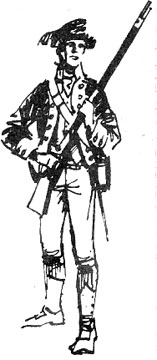 |
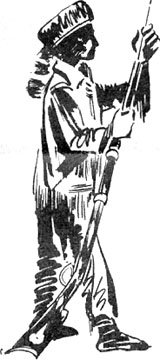 |
Square American You’ve heard of the “square American?” You know him well - the farmer, factory hand, businessman, secretary or housewife, from the plains, the small towns, the crowded sidewalks of the big cities. Since 1776 they have been doing a job without praise or fanfare - a job of building this country. Collectively, they are the “square American.” They salute the flag in unison with a Second Class Scout when he says, “I pledge allegiance...” They stand each time the Colors pass at a parade. They “oh” and “ah” at fireworks on July 4th and applaud with tears in eyes when a band plays “America the Beautiful.” They look on in amazement and disgust as a small minority, who call themselves Americans, perform acts of civil disobedience. These are the “square Americans”; the majority of the folks back home. They are proud of their American heritage, proud of their country’s continued fight to preserve the freedom of other nations, as well as their own. And most of all, proud of you - the American soldier; and proud of the job you are doing in Vietnam. Yes, we have a lot to be thankful for - we are Americans. |
 Heritage Traced Through Wars
Heritage Traced Through Wars
Out of the clash of men and ideas, the spark was struck in flint and steel at
Lexington. It glimmered low at Long Island and Valley Forge, then burst into
victorious flame at Saratoga and Yorktown, to become a proud, pulsing radiance
to light the way for succeeding generations.
Out of the fires of adversity, an Army was born, a Nation forged. Under its
banners of “Liberty” and “Don’t Tread on Me,” it sent a shock wave around the
world that toppled the divine right of kings and established the rights of man
to life, liberty and the pursuit of happiness.
The victories gained by the Continental soldier were brought at great price -
of blood and travail on the march to Trenton, of dreary months of fighting and
foraging with no pay, of scanty rations he had to cook himself, and bitter
reverses as he fought an enemy better equipped and better trained. But he
endured and won through to victory.
The legacy he bestowed carries with it an awesome responsibility - the
obligation for vigilance and national service to defend those hard-won rights
and freedoms. It is a responsibility that must be constantly renewed in every
generation - as it was at Chippewa, Buena Vista, Shiloh, Santiago, at the Marne
and Argonne, at Guadalcanal and Normandy and Chipyong-Ni, and now in Vietnam.
|
Artwork & Partial Text |
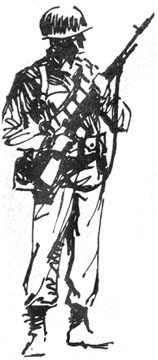 |
The Soldiers’ Creed I AM AN AMERICAN SOLDIER. For the American people, my family, my fellows, my sons to come - I carry on. Born of explorers, colonists, hunters in deer skins; schooled in the wilderness, fighting for our continent - I carried on for the rights of man. Wherever I was needed, whenever I was called, I stood and delivered, I came through. I was America on the march. And now today here I come again, marching again at the same old job - same old, brand new job - marching again with all free men. I am the ring of steel around Democracy; the ramparts that you sing about; I am the Citizen Soldier; the Nation in Arms. I am the eyes of the cannon, the marching refrain, the brains of the tank, the nerves of the plane, the heart of the shell. I am the Liberty Bell; the salt of our youth. I am the fighting man of every outpost from Alaska to Hawaii and beyond; from Puerto Rico to Greenland and beyond. Whatever the need - for the spirit of Liberty, for the future we’re making - I, the American Soldier, am the ultimate weapon. |
Much to Be Thankful for
Page 4 TROPIC LIGHTNING NEWS November 20, 1967
Psp Deflects RPGs
Why do 52 tons of steel need the added protection of perforated steel
planking (PSP) normally used on airport runways?
The PSP acts as a buffer delaying the shape charge of the enemies RPG
anti-tank rocket reducing the damage to the hulls of M-48 tanks.
The discovery was made by the 25th Div’s 3rd Sqdn, 4th Cav, recently. The
squadron commander, LTC John Shea, working with the 44th Explosive Ordnance
Demolition (EOD) Team tested the effectiveness of various materials against the
RPG-7 rocket. The squadron’s Bravo Trp had captured two of the rocket launchers
earlier in a battle with an estimated 60 Viet Cong near Trang Bang.
Firing at a tank hull, Shea discovered that PSP was effective in deflecting
the main charge of the rocket.
The RPG-2 will blast through six to seven inches of tank armor. The RPG-7
will cut through 12 inches of tank hull.
As quickly as the squadron’s welding shop could produce mounts for PSP, the
long metal strips were attached to the tanks.
Shea’s discovery has had far-ranging effects. The division’s 1st Bn (Mech),
5th Inf, has mounted PSP on its armored personnel carriers.
Boxing Champ Now Medic
“Wolfhounds” of the 25th Inf Div have a medic who packs a wallop that few
people suspect.
PFC Earnest McIntyre of Winston Salem, N.C., now treats 2nd Bn, 27th Inf,
battle casualties on Operation “Kolekole” but it wasn’t too long ago that he
spent his time decking other G.I.’s with his powerful punch.
For five months he was bantam weight boxing champion of the 24th Div in
Germany. He held the title from April to August of this year when orders for
Vietnam cut short his career. Now he works out with the 2nd Bde unit on combat
sweeps deep in the Iron Triangle.
Mclntryre says he misses the sport and wishes there was a boxing program in
the 25th Div but realizes that even if there was one he wouldn’t have much of a
chance at it.
“When you’re on combat operations 24 hours a day,” he says, “it doesn’t leave
too much time for anything else.”
Future plans for the Wolfhound medic after Vietnam include a lot of workouts
with a punching bag and another crack at the ring.
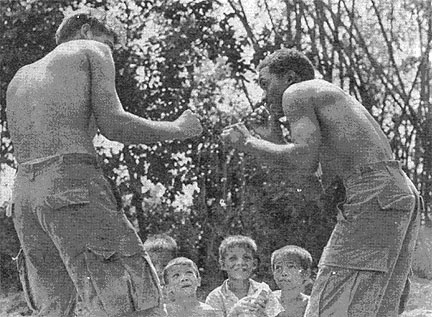 |
NO GLASS JAW - PFC Ernest McIntyre (right) shows a member of his unit, the
2nd Bn, 27th Inf, a little of his boxing technique as a group of Vietnamese kids look on in amazement. (Photo by SP4 Joe Carey) |
A Tense Situation
An elaborate hoax or Viet Cong almost caught in the act provided a few tense
moments recently for members of an ammunition convoy on their way through a
rubber plantation between Tay Ninh and Dau Tieng.
Truck drivers from the 6th Bn, 77th Arty, and their “shotgun riders” from HHB,
25th Div Arty, weren’t quite sure of the situation when an Armored Personnel
Carrier (APC) leading the convoy slid to a stop just short of an 8-inch
artillery round lying in the middle of the road. The round was partially
covered by tree branches.
Not knowing whether this was the beginning of a VC ambush, or perhaps a
command detonated boobytrap, the APC began firing its .50 cal. machine gun into
the woodline in hopes of flushing the enemy.
Hearing the sound of fire the drivers and crews quickly dismounted and
prepared for the worst. After a few tense minutes the “all clear” was given and
the convoy cautiously detoured around the projectile and continued on its way.
The round had evidently been left in the road by someone with a
weird sense
of humor, or possibly the VC had almost been caught in the act of setting up a
boobytrap and had abandoned the round as the convoy approached. It was later
destroyed by U.S. troops.
6/77 Fires 100,000th
Three officers stood flipping a Vietnamese coin in the hot morning sun at a
25th Inf Div’s fire support base, playing a game of odds or evens.
Just passing the time of day? Not really. These three officers were
deciding in which firing battery COL John R. Thurman III, 25th Div Arty
commander, would pull the lanyard on a 105mm howitzer signaling the 100,000th
round fired by the 6th Bn, 77th Arty, since arriving in Vietnam earlier this
year.
As chance would have it, COL Thurman went to Charlie Btry, the same battery
that had fired the first round in Vietnam May 24.
LTC James F. Fulton Jr., 6th Bn, 77th Arty, commander, went to Btry B, and
MAJ Jack E. Loos, the battalion executive officer, went to Btry A.
At a given signal, the three officers simultaneously pulled the lanyards on
three howitzers. Their timing was so good it was not known which fired the
first, and 100,000th round.
Newly Formed Delta Company Bags First Charlie In Ambush
DAU TIENG - Waiting until the Viet Cong was “right next to the claymore,” SP4
Joe Repasky bagged his platoon’s first “Charlie” in an ambush set up southeast
of the Michelin Rubber Plantation recently.
The L-shaped kill zone of the platoon-size ambush had been set along a trail
running south from the big plantation. As machinegunner SP4 Jackson Bowman
looked up, he saw two Viet Cong coming around the bend in the trail.
“I saw the head and shoulders of the two Viet Cong and passed the word down
to the other men,” said Bowman.
The two Cong, dressed in black pajamas and carrying AK-47 assault rifles
moved right into the kill zone when Repasky detonated the claymore. One was
killed instantly while the other amazingly escaped into the dense jungle
surrounding the ambush site.
This was the first Viet Cong killed by the 3rd Plt of the newly formed D Co,
3rd Bn, 22nd Inf.
For Minor Ailments
It’s “Mini-MEDCAP”
A “mini-medic” in the 25th Inf Div will soon be conducting “mini-MEDCAPS” for
the people of Hau Nghia Province northwest of Saigon.
The man and the program are parts of the Div’s 2nd Bde taking part in
Operation “Kolekole.”
“I know 120 pounds isn’t much,” says SP4 George Sims, “but I can still keep
up with the big guys.”
The 1st Bn, 27th Inf “Wolfhounds,” medic leaves little doubt about it when he
explains that in his five months on line he has treated more than 75 wounded
comrades, many of them under heavy fire.
Sims, a native of Baltimore, volunteered for duty in Vietnam and recently
volunteered again for a new Civil Affairs program to be conducted by the unit.
“The idea is that a special small unit will immediately follow up all combat
operations with small scale Medical Civic Action Programs to treat minor
injuries and ailments,” says Sims. “We like to call them mini-MEDCAPS.
“The people in the program figure there are many ways of helping the
Vietnamese people,” he explains, “and maybe the best way of all is to bring them
health.”
Cong Bunker Is No Place To Keep C-4
DAU TIENG - “I was stunned for a moment because I knew if I had set the case
of explosives on it, it would have been all over for me,” said SP4 Larry Osborn
of North Platte, Neb.
While with the 2nd Bn, 12th Inf, northeast of the Michelin Rubber Plantation
on the 3rd Bde, 25th Inf Div’s Operation “Diamondhead,” Osborn was stacking
explosives into an old Viet Cong bunker found earlier that day.
“We were stacking the C-4 into the bunker, I was just about to set the fourth
down when I noticed a partially covered grenade protruding from the ground.”
Carefully removing the remaining cases of explosives, Osborn destroyed the
booby-trapped grenade and the bunker with one of his own hand grenades.
| DUCK AND FIRE - Scrambling forward under intense enemy automatic weapons fire, a soldier of the 1st Bn, 27th Inf “Wolfhounds,” advances on Viet Cong positions before the 25th Div unit overran the enemy, killing all 20 enemy soldiers. The action took place 65 kms northwest of Saigon. (Photo by SP4 Gary Gatliff) |
 |
Page 5 TROPIC LIGHTNING NEWS November 20, 1967
Miscellaneous Shutter Clicks
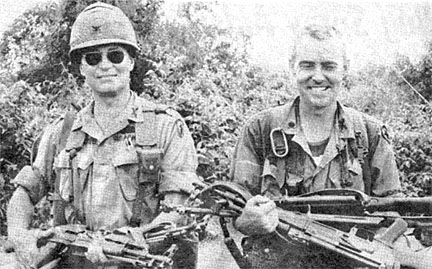 |
| COL EDWIN D. EMERSON AND LTC DAVID HUGHES DISPLAY CAPTURED WEAPONS. |
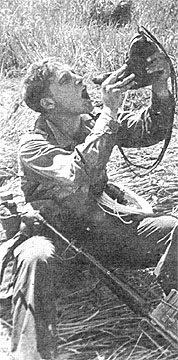 |
 |
 |
| SP4 JOHN PULLIATTE DRINKS FROM A BOTA. | VIETNAMESE WORKER READS WAR NEWS. | A 3RD BDE GI WADES THROUGH JUNGLE STREAM NEAR DAU TIENG. |
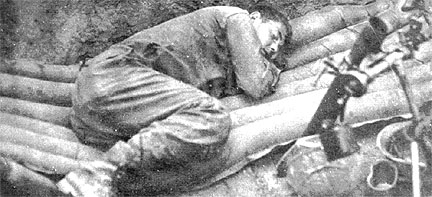 |
| SP4 DANIEL HEMPHILL TAKES A WELL EARNED REST NEAR HIS WEAPON DURING A LULL IN FIRE MISSIONS IN THE HOBO WOODS. |
Page 6 TROPIC LIGHTNING NEWS November 20, 1967
Bug Spray Aids Startled Soldier
The old saying, “nothing is lower than a snake in the grass,” recently proved
itself true to a slightly shaken 25th Inf Div soldier.
“It all started with an ambush patrol I was on,” said SGT Phillip Williams, a
squad leader with the 1st Bn (Mech), 5th Inf. “We left the base camp at dusk
and headed for the ambush site.”
The 22-man patrol set up in an opening with scattered brush piles to their
front. As they settled back to wait through the night, a full moon spread light
across the field.
“We had been in position about an hour,” Williams said, “when I heard
rustling noises in the tall grass in front of me.”
At first thinking the noises were rats scurrying around, the soldier ignored
the sounds. But minutes later he noticed the grass move three feet in front of
him.
“All of a sudden something raised straight out of the grass and stayed there
waving back and forth. I couldn’t believe my eyes,” he said.
A large king cobra had come to investigate the strangers who had entered his
domain.
The snake slithered nearer and Williams grabbed the first thing he could get
his hands on, a can of DDT bug spray. Aiming as straight as possible with
trembling hands, the squad leader opened up on the deadly enemy.
“I was lucky,” said Williams, “the bug spray worked as a snake repellent and
sent the cobra running for cover.”
It’s Just Another Convoy
How does one feel when driving through enemy territory with more than five
tons of high explosives in the back seat?
“I haven’t really thought much about it,” said SGT Robert Benline of Dayton,
Ohio, motor sergeant and part-time ammo driver with Btry C, 6th Bn, 77th Arty.
“It doesn’t make much difference to me whether I’m carrying explosives or
timber, it’s my job to get the load through and that’s what I concentrate on,”
he added.
“I think it’s more dangerous on the highways back home.” says PFC Arthur
Sotirakopoulos of Haverhill, Mass., a member of the 6th Bn’s Alpha Btry. He
feels that, “We may have to worry about Viet Cong boobytraps, mines and ambushes
here, but a fool behind the wheel in the States is just as dangerous.”
PFC Robert Bolton of Americus, Ga., also a member of Charlie Btry, expressed
his feelings about the same way. “I think I was a little apprehensive my first
time on an ammo convoy,” he said, “but I’ve since learned it’s just another
job.”
All three drivers were in complete agreement on one subject. “We consider it
very important to keep our speed as constant as possible,” said Sotirakopoulos
(nicknamed “Alphabet” by his friends). “Driving is much easier, especially on
long hauls, if we don’t have to keep stopping and starting. Of course, standing
in one place very long also makes a good target,” he emphasized.
“About the only real problem we have is the weather,” said Benline. “One
minute we will be in a cloud of dust, and the next be axle deep in mud. It
makes driving a little tough at times, but nothing we can’t handle,” he
concluded looking at the others. They both nodded in agreement.
Sports Program Started
DAU TIENG - In a recent presentation the 3rd Bn, 22nd Inf, inaugurated an
intramural sports program for the local high school.
Under the direction of CPT Wilmer A. Arroyo, Battalion S-5, the ceremony
began with a poem of thanks, followed by the presentation of 24 bright red and
blue uniforms to two of the four girls’ teams.
Each company in the battalion plans to equip and support its own team. 1LT
Walter W. Ivie and 1LT James E. Slinkard, representing Alpha and Bravo companies
respectively, gave the outfits to their teams.
The battalion plans to give this sports program strong support in the hope of
bringing more competitive sports into the local high school.
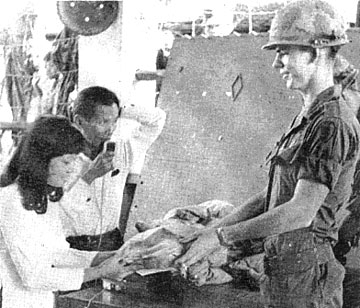 |
A GIFT - 1LT Walter W. Ivie gives volleyball uniforms to students of Dau Tieng High School. The 3rd Bn, 22nd Inf, of the 3rd Bde, 25th Inf Div, is sponsoring the intramural sports program. (Photo by SP4 Vince Housden) |
LTC Kiefer Is Bn CO
LTC Thomas H. Ball passed the leadership of the 3rd Bn, 13th Arty, to LTC
Homer W. Kiefer Jr., in ceremonies held at the Bn’s headquarters recently.
Ball commanded the self propelled howitzer battalion for nine months and is
being reassigned to the II Field Forces, Vietnam.
Kiefer obtained his commission at the U.S. Military Academy, and a masters
degree in English from Columbia University. He has been awarded the Army Commendation
Medal with oak leaf cluster, and has seen service in Alaska and Saudi Arabia.
Weapons Safety Taught
Each night clerks, switchboard operators and other members of 86th Sig Bn
units stationed here head for the bunkers surrounding the base camp of the 25th
Inf Div.
During the night they may be called upon to fire any one of a number of
weapons not normally in a support soldier’s arsenal. But, they are trained to
perform these extra guard duties safely.
“We teach a class stressing the safety aspects of all of the weapons the men
may be called upon to use,” says CPT M. M. Myers of Vermillion, S.D., training
officer for the 86th. “As far as we know, it is a somewhat unique course and it
pays off. Since we began the course in July we have had no injuries from
weapons,” he says.
The biggest help, according to CPT Grady M. Traxler, Baca Raton, Fla.,
battalion operations officer, is the four-hour firing exercise that each man
must go through before he is assigned as a bunker guard.
Flower Garden At DISCOM ‘Most’ Beautiful
The chapel at the 25th Inf Div Spt Cmd Headquarters has the most beautiful
flower garden on base camp. Chap (MAJ) Donald J. Ostroot, the Spt Cmd chaplain,
reports that many camera enthusiasts have been taking pictures of the colorful
display in front of the chapel.
The flowers have been carefully planted and pruned by SP5 Charles Walker of
HHC Spt Cmd and his crew of Vietnamese workers.
The chapel has also been improved by building of a steeple, a pulpit,
literature cabinet and confessional booth by the chaplain’s assistant, SP4
Jonathan Lochmann.
Page 7 TROPIC LIGHTNING NEWS November 20, 1967
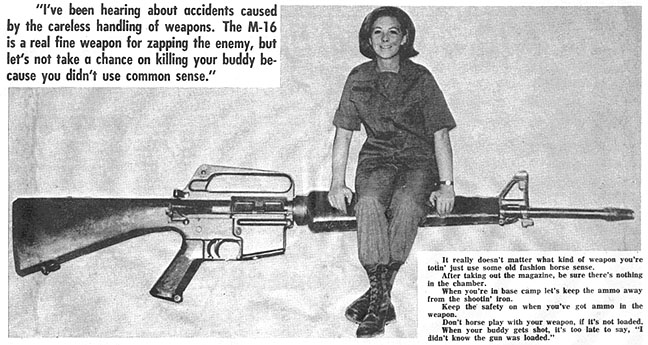 |
|
It really doesn’t matter what kind of weapon you’re totin’ just use some old
fashion horse sense. After taking out the magazine, be sure there’s nothing in the chamber. When you’re in base camp let’s keep the ammo away from the shootin’ iron. Keep the safety on when you’ve got ammo in the weapon. Don’t horse play with your weapon, if it’s not loaded. When your buddy gets shot, it’s too late to say, “I didn’t know the gun was loaded.” |
|
|
Page 8 TROPIC LIGHTNING NEWS November 20, 1967
25th MID Awarded Unit Commendation
The 25th Military Intelligence Detachment (MID) was recently awarded the
Meritorious Unit Commendation at the 25th Inf Div base camp.
The award, presented by MG F. K. Mearns, division commander, was for
outstanding service during the period January 1966 to March 1967. MAJ Robert J.
Wheeler, commander of the detachment, accepted for the MID.
The citation which accompanied the award read in part, “The members of the
unit demonstrated extraordinary diligence, tenacity and skill in providing
intelligence information on enemy forces for the 25th Infantry Division.
“Through its remarkable acuity in all phases of intelligence operations,
including radar image interpretation, order-of-battle planning and target
analysis, the unit has contributed immeasurably to the ability of the 25th
Division to carry out its vital counterinsurgency mission in the Republic of
Vietnam.”
Teams from the detachment were deployed with the alerted brigades of the 25th
Div in Vietnam in late 1965 and early 1966. The Det Hqs and main body arrived
in Vietnam in March 1966.
This was the second Meritorious Unit Commendation for the MID, having
received the award for action in Korea.
The MID has also been presented the Philippine Presidential Unit Citation for
services in World War II.
The period marked by the Unit Commendation shows a fine record of awards.
They include three Legion of Merit Medals, 25 Bronze Star Medals, 31 Army
Commendation Medals, 5 Purple Heart Medals and 4 Air Medals.
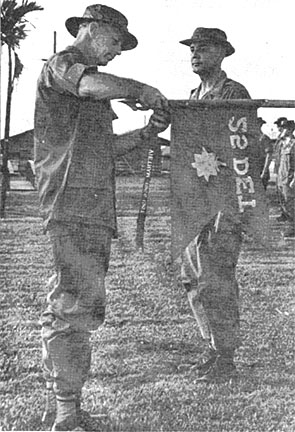 |
PROUD MOMENT - MG F.K. Mearns, commanding general of the 25th Inf Div attaches the Meritorious Unit Commendation streamer to the 25th MID Guidon. Accepting the award for the MID is MAJ Robert J. Wheeler, commander of the detachment. (Photo by PFC Robert Smith) |
Helicopter Blocks Enemies Escape
With enemy fire snapping wildly around his helicopter and a platoon of Viet
Cong in his sights, a 25th Inf Div door gunner ran out of ammunition four times
before finally ceasing fire.
SP4 Larry Kerr of Walsh, Colo., a gunner aboard the 2nd Bde command and
control helicopter, had settled back for a long day in the air when the Bde XO,
LTC Fremont B. Hodson, spotted 20 Viet Cong in the rice paddies below.
With an infantry company sweeping less than one kilometer away the helicopter
swung into a low firing orbit to block the enemies escape while the U.S. unit
maneuvered.
Kerr blasted away with his M-60 machine gun and pinned the enemy down before
he ran out of ammunition.
Hodson and the others aboard the command ship quickly passed yards of
link-belt ammunition from the other gunner and Kerr again began firing.
When he exhausted that supply he grabbed the M-16 rifle stowed in the ship
for emergencies and fired until it too fell silent.
Before he slumped back into his seat exhausted, Kerr had prevented the
enemies escape, killed two, and wounded several more VC in the effort.
Patrol Gets Ambushed But Turns The Tables
A 25th Inf Div ambush patrol reversed the score on Viet Cong guerrillas who
first ambushed them and came back for a second try.
Operating in the dense undergrowth of an abandoned rubber plantation near Dau
Tieng, the ambush patrol from Charlie Co of the 1st Bn, 27th Inf “Wolfhounds,”
had moved about one hundred meters from its base camp when hidden VC showered
them with close but ineffective rifle grenade fire.
Knowing the patrol’s secrecy had been shattered, they started to return to
the base camp when the last two men spotted someone following them.
Dropping off a stay-behind party, the patrol moved another 75 meters and set
up a hasty defensive perimeter.
Armed with a machine gun, grenade launcher and M-16 rifle, the stay behind
party waited on the far side of a small clearing along the jungle trail.
Three heavily-armed Viet Cong walked confidently into the clearing and the
Wolfhounds opened up, downing all three.
Viet Cong Lose R&R
A Viet Cong “R&R Center” deep in the HoBo Woods was closed down recently by
men of the 4th Bn (Mech), 23rd Inf.
Inside a circular 600-meter trench the company found nine kitchen hootches,
each with a two-burner stove. Close to the kitchens were larger buildings that
battalion officers said had been used as sleeping quarters.
The battalion size camp had apparently been occupied by a “housekeeping”
platoon in recent months, officers explained.
Rice Cache Discovered
DAU TIENG - A large rice cache of over two tons was discovered recently by
3rd Bde, 25th Inf Div, troopers southeast of the Michelin Rubber Plantation on
Operation “Diamondhead.”
Hidden from view by a thick cover of bamboo, the cache was discovered when
members of the 3rd Bn 22nd Inf, began to probe the ground around a hut which was
encased by the bamboo.
The tedious probing paid off with two large, mat-lined holes on either side
of the hut.
Next Step Was A Big One
A 25th Inf Div soldier keeping pace count for his platoon suddenly got that
sinking feeling when he put his foot down for the 2,000th time - and plunged 15
feet into a cavernous well.
SP4 Jay Gatts of Moundsville, W. Va., had been pacing off the distance at the
rear of his platoon while it stole through the brush on an ambush patrol.
As he stepped out for the 2,000th pace, down he went.
The entire column, except the two men behind him, had somehow managed to miss
the grass-covered hole.
Added to the shock of his sudden loss of terra firma, Gatts recalled, was a
mounting fear no one would miss him.
The 2nd Bde soldier, a member of the lst Bn, 27th Inf “Wolfhounds,”
eliminated that problem with one piercing shout for help.
SP4 Ronald Breshears of Martinez, Calif., the platoon’s forward observer, had
been a few feet behind the fallen soldier.
He rushed forward and peered into the well. Keeping in mind the mission’s
need for stealth, Dreshears quickly whispered, “Gatts, shutup!”
Then, as if to reinforce the point, the observer’s flashlight slipped from
his web gear and followed Gatts into the well, scoring a direct hit on his
upturned brow.
Unhurt, Gatts doubled his frantic efforts to climb out of the well, but then
confined his activity to treading water.
“I was sure I was going to drown with all the heavy gear on,” he said later,
“but I realized I was standing on something.”
That life-saving something was a log wedged against the sides of the well.
Meanwhile, up above, rescue efforts were underway.
SP4 Juan Pichardo of El Paso, Tex., Gatts’ team leader, was scrambling
through the column collecting rifle slings. He fashioned them into a make-shift
rope and lowered it to the soaking soldier.
It took Pichardo, leaning halfway into the well, and two others to haul the
rifleman back to ground level.
“Boy, I was glad to get out of that hole,” Gatts exclaimed. “I’ve worked in
the West Virginia mines and felt claustrophobia before, but nothing like in that
well.”
Thanks to:
Joe Carey, 25th Admin. Co.,
for sharing this issue,
Kirk Ramsey, 2nd Bn., 14th Inf. for creating this page.
This page last modified 08-18-2005
©2005 25th Infantry Division Association. All rights reserved.